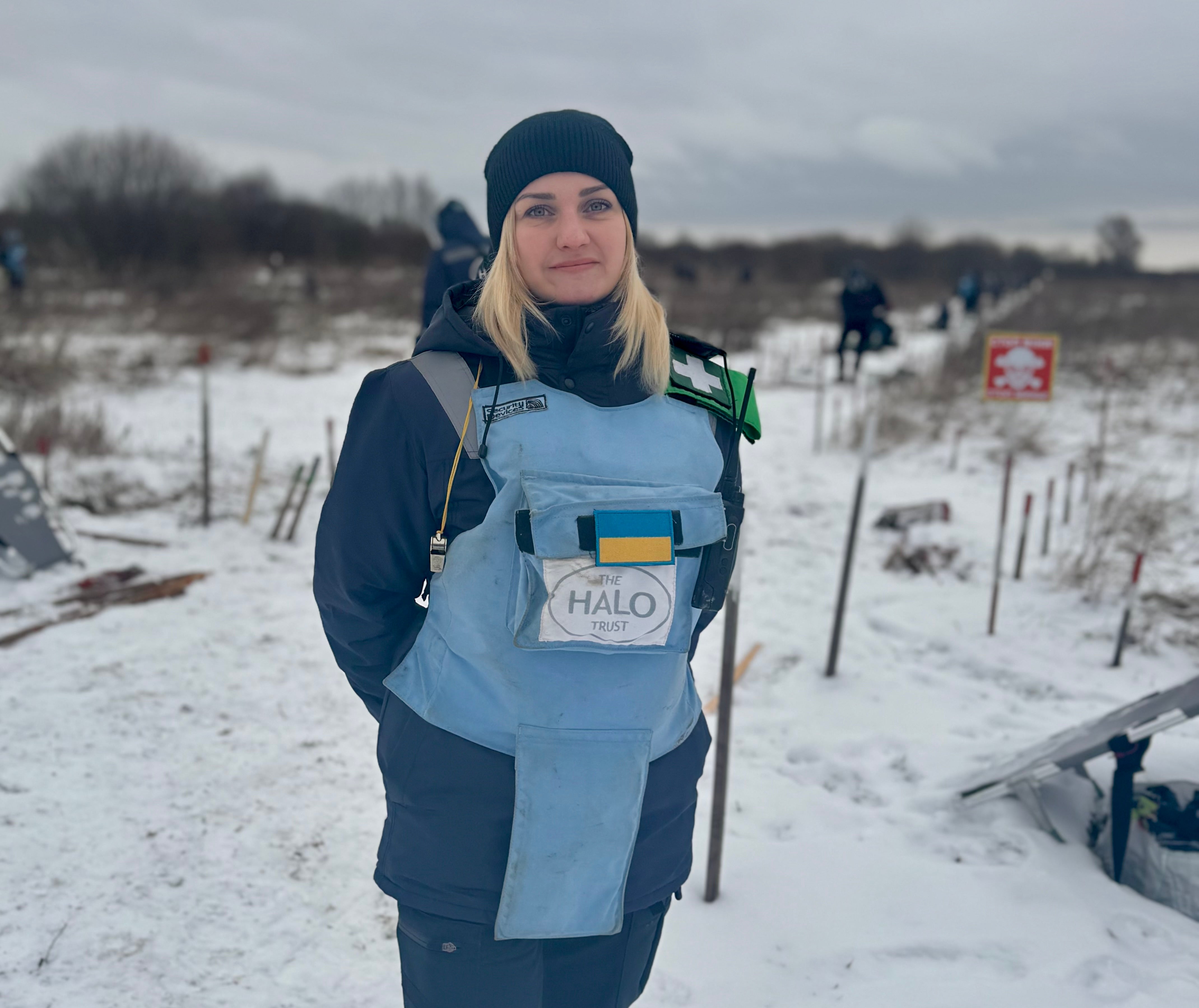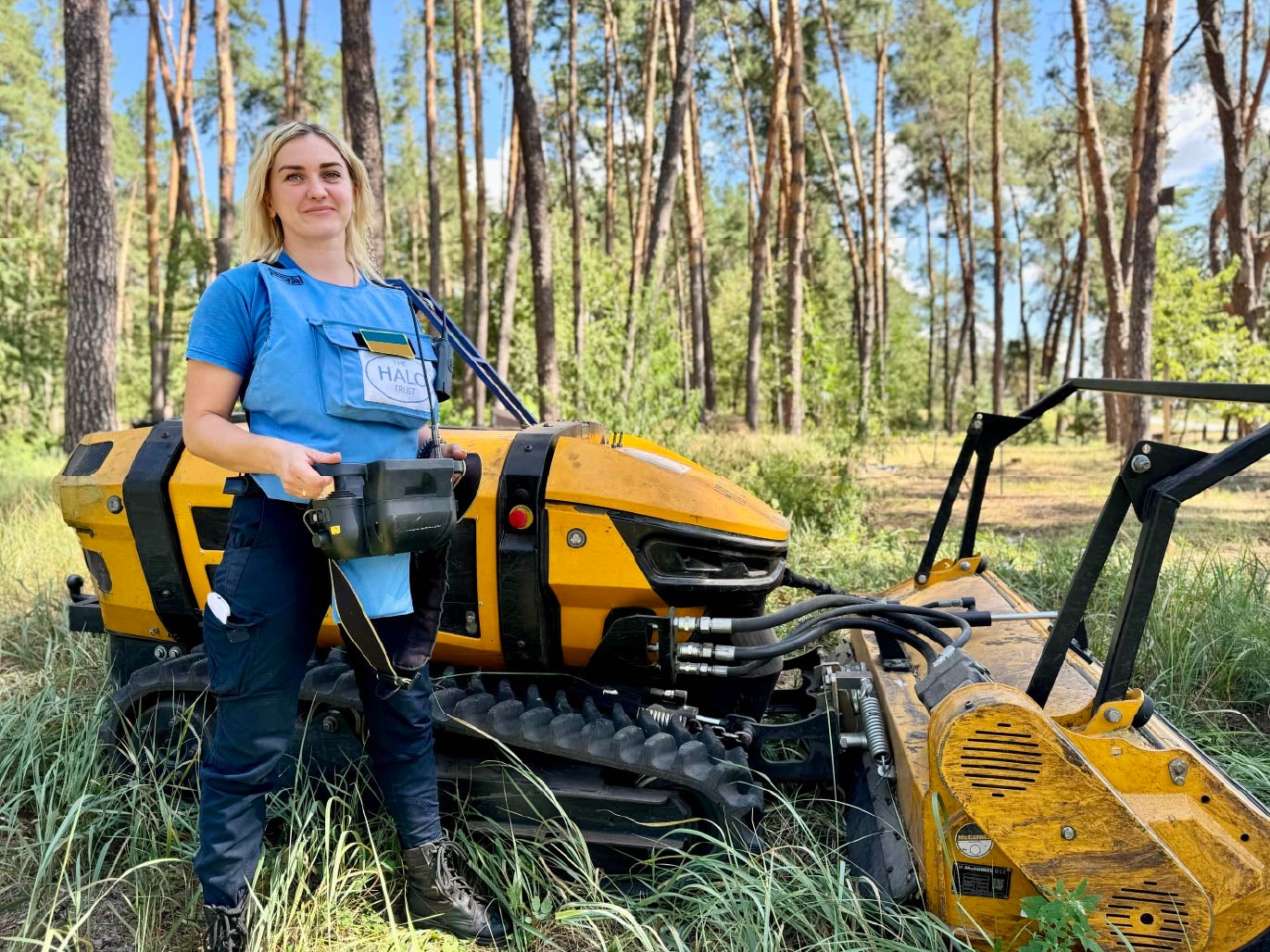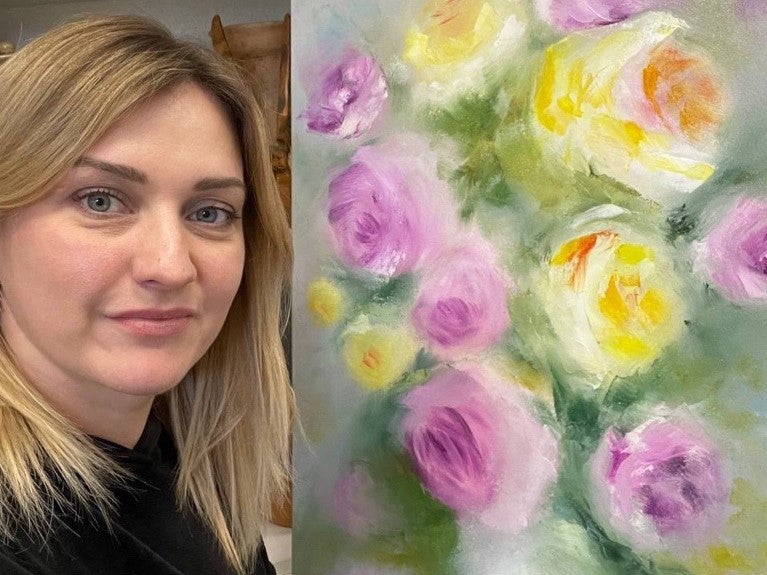Tetiana Rubanka, a deminer: "What seems ‘not a woman's job’ may turn out to be your mission. We are strong. We can do it all!"
Date:

Photo: HALO Ukraine/Iryna Krykunenko
Tetiana Rubanka is a deminer and demining team leader at The HALO Trust, an international organization in Ukraine. One day, she changed her heels and dress for boots, a uniform and a detector, and has been dedicating herself to humanitarian demining for two years.
Tetiana's main motivation for trying herself in a new field was the desire to clear the Ukrainian land of mines and unexploded ordnance so that the military and civilians could return to safe territory: “I believe that this is my mission, and I am glad that I can contribute by doing this important work.”
Read more about Tetiana's professional path, what her working day consists of, and what inspires her to continue working in our interview with Tetiana.
How did you start your professional career in this field? How did you find out about this opportunity?
Before I joined The HALO Trust, my life was completely different - I worked in the soft furnishings industry. You know, I lived a quiet, ordinary life, like many of us. But with the beginning of the full-scale Russian invasion, everything completely changed. I realized that I wanted to be useful to my country here, in the rear, while our defenders are holding the front. I learned about the opportunity to work at HALO from my friends.
I jokingly say that one day I exchanged my heels and dress for boots, uniform and the detector I now work with. I've been with HALO since 2023 and have been dedicated to humanitarian demining for two years.
What motivated you to join demining?
It was definitely not a spontaneous decision. I am a military wife, and I was motivated by the desire to help - to clean up the Ukrainian land so that our military and civilians would return to a safe territory when they come home, where there is no threat from mines or shells. I believe that this is my mission, and I am glad that I can contribute in this way.
How did your family and friends react to your choice?
The reactions were very different. To be honest, many people still have stereotypes, such as “It's not a woman's job,” “You have two children,” “Think about it, it's dangerous,” “Why would you do that?” Even now, when I've been working in this field for more than two years, some people still think it's too risky and don't understand my decision.
But as for my family, it's different. My husband is a very wise man. He always supports me. Yes, when I first told him I was going to join demining, he was naturally worried. But he accepted my choice and was morally with me at every stage.
But as for my family, it's different. My husband is a very wise man. He always supports me. Yes, when I first told him I was going to join demining, he was naturally worried. But he accepted my choice and mentally supported me at every stage.
At first, my parents were worried about my choice, especially my mother. Like any mother, she is very worried about me. And it's not just the difficult work, but also the weather conditions and danger. But after I told her about the training, how the employees comply with safety standards, and how we work in buffer zones, she calmed down a bit and was able to accept my choice. Now she supports me.
Are your children interested in your work?
I have two children: a boy and a girl, aged 10 and 12. They know who their mom works for, they are worried, but at the same time they are very curious. Every day they ask: "Mom, how are you? What did you find today?"
When I was in training, we even explored mines together. I had printouts with the types of mines, so they showed them to me, and I had to tell them where they were. They tested me like real teachers! And as a result, they already know what a mine looks like and what to do if they see something suspicious: stop, don't let anyone near, and immediately call the SES or the police. And do not touch anything under any circumstances.
How long did the training last, and how prepared did you feel for real work in the field?
The training lasted over a month. At first, we had theoretical lessons: we learned about the types of threats, demining methods, and how the detectors work. Then there were practical training sessions on special training fields where we worked with the equipment.
After that, there were written exams and a practical test. The selection is quite serious, you need to know everything well to get admission to work.
So, I felt well prepared - so much so that after the training, I wanted to go out to real minefields as soon as possible and experience it all in practice.
Did you need any specific skills or knowledge to start studying in general?
No, no special knowledge was required. Before that, I worked as a sales manager for soft furniture, and that didn't stop me from changing my profession.
In this field, the main thing is desire. Anyone with any experience can try themselves in demining, and they will succeed. All you need is motivation and willingness to learn.
Do you remember your first demining case, when you discovered and defused an explosive object?
The first days at work were very stressful - I was nervous, I was shaking inside. It's a mixture of fear and adrenaline, when you're both scared and excited. We studied a lot, and I really wanted to see how it works in practice.
On the one hand, I was afraid, and on the other hand, I felt like I was doing something really important. The feeling that my work is a real contribution to security was very inspiring.
After a week on duty, you realize what you are dealing with. Fear does not disappear completely, and that's good, because it helps you to be careful and not make mistakes. But over time, you become more confident.
What stereotypes have you faced as a woman in this profession?
The profession is treated as “unfeminine” - they say it is dangerous, difficult, physically challenging. But I personally do not face this at HALO. We have a lot of women in our team, and there is no prejudice: everyone is equal here - the main thing is how you do your job.
In addition, the organization is committed to gender equality policy: we regularly attend trainings and discuss these topics. This is supportive and motivating. Women are respected, and they successfully realize themselves in various roles: deminers, paramedics, machine operators, team leaders.
Having started as a deminer, you have grown in this field. What was your professional path in demining?
After working as a deminer for some time, I was trained as a paramedic. Then I was assigned to a leadership course, and I became the leader of a manual demining team.
Last summer, I took a course for leaders of mechanical demining, passed the exams, and now I can lead both manual and mechanical demining teams.
Currently, I am the head of a team of 9 people, in which there is only one woman, but in general, about 30% of the staff at HALO Ukraine are women. And not only among the deminers - they hold managerial positions, work on complex equipment, etc.
I believe there should be more women in this field. Ukrainian women are extremely strong in spirit. We can do anything!

Photo: HALO Ukraine/Iryna Krykunenko
What does your working day look like? What are your daily responsibilities and working conditions?
We have a rotational work method: 10 days of work, followed by 4 days off. The working day starts at 8:30 a.m. right on the field and lasts until 3:40 p.m., with a lunch break.
Now I work near my home, so I can come back every evening. But if we work in remote locations, we live in houses rented by the organization for 10 days. For me, this is a convenient schedule because weekends also fall on weekdays, so I can take care of household tasks, go to the doctor, do paperwork, etc.
Every working morning, I meet the team at the warehouse, load the equipment, and drive to the site. The team is deployed there - I arrange the team in accordance with safety methods and standards. I control the observance of a safe distance between deminers, control points, and delegate tasks.
I always conduct a safety briefing. At the end of the day, I deal with documentation: I fill out reports both in paper form and in an electronic system - in a special application on my phone. I am also responsible for filling out a map of the areas where our team works.
Your profession may seem extremely dangerous to other people. How did you manage to overcome your fears?
Of course, there was fear, especially at the beginning. I remember the first time I went to a minefield after graduation - it was exciting. And when you find the first explosive object, you experience a mix of emotions: fear, adrenaline, and great responsibility. But along with that comes the understanding that this small mine could have caused serious damage, and I found it, so I saved someone's life.
This is very motivating. You realize that your work is not just a profession, it is something much more.
As for safety, HALO takes a very responsible approach to it: there are clear instructions, operating standards, safe zones, and buffer distances. If you follow all the rules, the risks are reduced to zero. Everything is thought out to protect each team member.
What is your equipment like? Are the uniforms and protective equipment comfortable, especially for women?
Our equipment includes everything necessary for safety. For example, we use a visor, a special protective shield that covers the face and neck.
We also wear a lightweight armor vest - it covers only the front of the body, so it does not restrict movement. It is soft and comfortable, which is very important, especially for women. Previously, these armor vests were stiffer and less comfortable, but now everything is much better thought out. If we work in high-risk areas, for example, in the 30-kilometer zone from the front line, we use heavy armor. It's also adapted for women - there are options tailored to women's anatomy, cutouts, and a more fitted cut.
The uniforms are very high quality and comfortable. For women, it is made with the body features considered: sconces, comfortable pants, soft fabric, muted colors. Everything is selected to make you feel comfortable in any conditions. This is important when you spend all day in the field.
What inspires you?
I am inspired by nature itself, even in my work. Yes, we work in minefields - it can be frightening, and it is often the site of someone's tragedy. But at the same time, this is our Ukrainian land, which, despite everything, remains beautiful. The sun, the field, the leaves, the mushrooms, the flowers - sometimes you catch yourself thinking that despite the threats around you, there are moments of real silence and beauty.
When I have some time, I make oil paintings. This is my therapy, my release. Painting gives me strength, helps me reload and return to important work with renewed energy.
What would you say to women and girls who want to get involved in demining but have doubts or think it's “not a woman's job”?
I want to tell all women: believe in yourself! Don't be afraid to try something new. Even if at first it seems like it's not for you, sometimes it's these challenges that reveal the true meaning of life. What seems like “not a woman's job” may turn out to be your mission. We are strong. We can do anything.

Photo: from Tetiana's personal archive